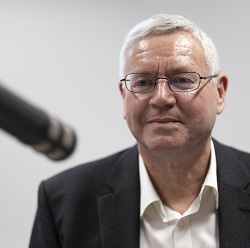Read a full transcript of this episode.
Background to this episode
“Dementia is a huge and growing problem but it’s not an insoluble or hopeless problem and great strides have been made in terms of research, in terms of understanding the disease, diagnostics and new treatments, although there is much more to do.” Professor John O'Brien
Dementia is one of the main causes of death in the UK and it regularly makes the headlines when high profile people choose to share their diagnosis or when there are new findings about possible causes.
There are currently around 900,000 people living with dementia in the UK and this is set to increase to over one million by 2025. Although age is a risk factor dementia is not an inevitable part of ageing.
In this episode, we talk to Professor John O’Brien, NIHR Speciality Lead for Dementia and Professor of Old Age Psychiatry, about why dementia rates are increasing, what research has found so far and what research is being done currently to improve diagnosis, treatment and care.
Our guests

Professor John O’Brien is Professor of Old Age Psychiatry at the University of Cambridge. He is a National Institute for Health and Care Research (NIHR) Emeritus Senior Investigator and the NIHR National Specialty Lead for Dementia.
His main research interests are in the clinical and research application of imaging biomarkers in dementia, dementia with Lewy bodies and clinical trials.
He has been a member of the National Institute for Health and Social Care Excellence (NICE), British Association of Psychopharmacology, European Federation of Neurological Sciences and European Stroke Association Dementia Guideline groups.
Glossary of terms
Agent(s) - the active ingredient(s) in a drug or medication.
Alzheimer’s Disease - the main cause of dementia. It is responsible for about two thirds of cases. It is named after German psychiatrist and neuropathologist Dr Alois Alzheimer, who first discovered the disease.
Amyloid - a protein that can build up in abnormal amounts in the body’s tissues and organs. When it builds up in the brain, it can cause dementia.
Dementia - a general term for a number of diseases that cause problems with thinking, memory and with the ability to undertake daily activities.
Dementia with lewy bodies - a form of dementia that has some relationship to Alzheimer’s and Parkinson’s disease. It not only affects the ability to think and remember but can affect movements so people can be slow and have difficulty walking, and may have a tremor (shake) and experience visual hallucinations (seeing things that are not there).
Frontal dementia or frontal temporal dementia - a cause of dementia that affects the front parts of the brain. It affects planning activities, judgement of social situations, emotional control and can cause problems with language.
Trafficking of proteins - refers to the movement of protein in cells around the body.
Tau – a protein that can build up in abnormal amounts in the brain, and when it does so, it can cause dementia.
Vascular dementia - a form of dementia caused by a reduced flow of blood to the brain, which can be caused by strokes or by diseases of blood vessels in the brain.
Mentions and links
Join Dementia Research is a service that connects registered volunteers who are interested in finding out about research with dementia researchers across the UK who are looking for people to join their studies. You can review your study matches once you register and then it’s your decision whether to take part. Taking part means you will make a real difference to the future of dementia diagnosis, treatment and care.
Disclaimer
The views expressed in this podcast are those of the author(s) and not necessarily those of the NIHR or the Department of Health and Social Care.





